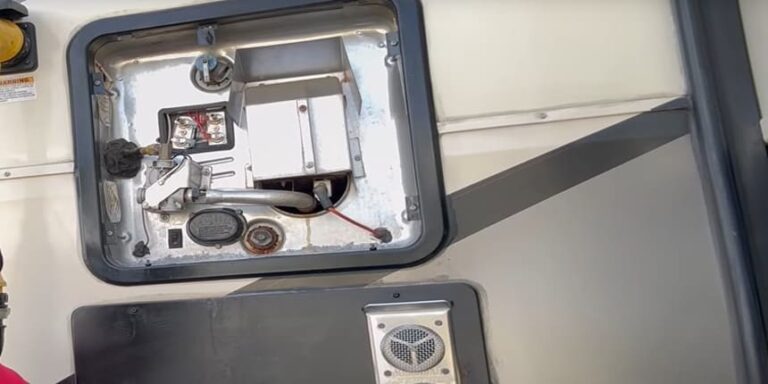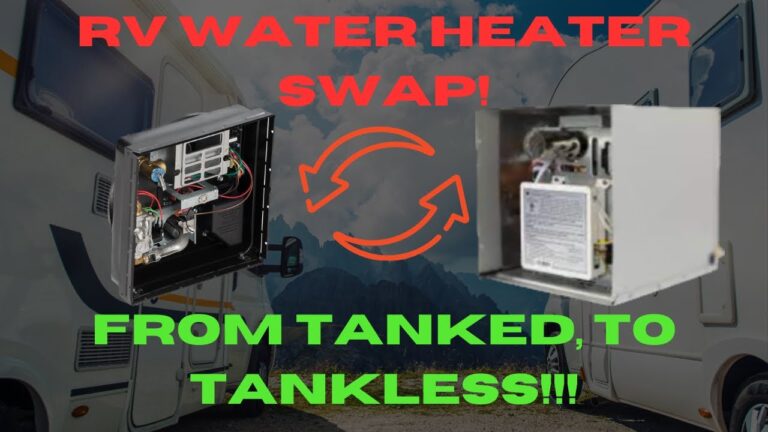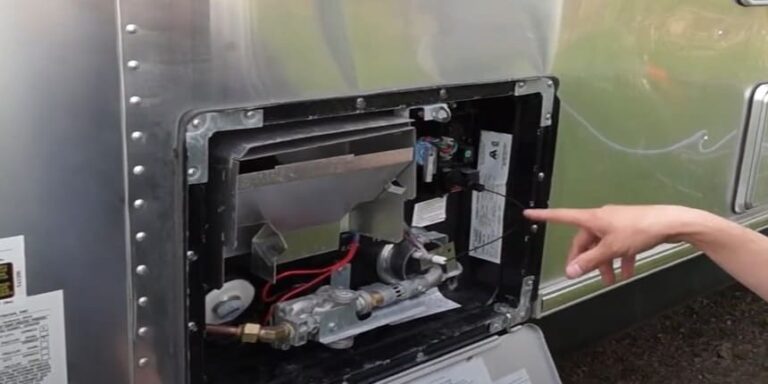Imagine hitting the road in your RV, the freedom of the open highway, and the promise of adventure ahead. There’s nothing like the comforts of home on wheels, especially when it comes to enjoying a hot shower after a long day of exploring.
But what happens when your RV tankless water heater decides to act up? Suddenly, that cozy, relaxing shower turns into a chilly surprise. You’re not alone in facing these unexpected challenges. Many RV owners encounter problems with their tankless water heaters, and understanding these issues can save you both time and frustration.
By recognizing common problems and learning how to address them, you can ensure your adventures remain stress-free and enjoyable. Dive into this guide to uncover the mysteries of RV tankless water heater problems and discover how to keep your travels smooth and your showers warm.

Credit: www.loveyourrv.com
Common Issues With Rv Tankless Water Heaters
RV tankless water heaters offer the convenience of hot water on demand, which is a luxury while traveling. However, they come with their own set of challenges. Understanding these common issues can help you tackle them effectively, ensuring your travels remain seamless. Below, we explore some typical problems you might face with RV tankless water heaters.
Temperature Fluctuations
One frequent issue with RV tankless water heaters is temperature fluctuations. Imagine stepping into a shower expecting a steady stream of hot water, only to be surprised by sudden changes in temperature. This can be frustrating, especially when you’re in a hurry. Such fluctuations often occur due to the heater’s sensitivity to changes in water flow. A simple adjustment in your faucet could trigger a temperature change. To minimize this, try maintaining a consistent water flow whenever possible.
Water Pressure Problems
Water pressure problems can also plague RV tankless water heaters. If you’ve ever noticed a weak stream of water, the issue could be linked to your heater. Low water pressure can result from clogged filters or inadequate pump performance. Regularly check your filters and clean them to ensure optimal water flow. Additionally, verify that your RV’s water pump is functioning correctly. A well-maintained pump can significantly improve your heater’s performance.
Unexpected Cold Water Bursts
Few things are more startling than unexpected cold water bursts during a hot shower. These can occur when the heater struggles to keep up with high demand or when there’s a sudden drop in water pressure. If you’re traveling with family, coordinate shower times to prevent overloading the system. Consider installing a flow restrictor to balance water pressure, ensuring a more consistent hot water experience. Has this happened to you before? How did you handle it?

Credit: blog.campingworld.com
Diagnosing Heater Malfunctions
RV tankless water heaters can sometimes face malfunctions. Identifying the issue early is crucial. Proper diagnosis can save time and money. It ensures the heater works efficiently again. Common problems include error codes, electrical issues, and gas supply concerns. Let’s explore how to address these challenges effectively.
Identifying Error Codes
Modern RV tankless heaters display error codes. These codes help identify specific problems quickly. Consult the heater’s manual for code meanings. Each code corresponds to a particular malfunction. Understanding these codes speeds up repairs. It’s the first step in troubleshooting heater issues.
Checking Electrical Connections
Loose connections can cause heater malfunctions. Inspect the electrical wiring carefully. Ensure all connections are secure and intact. Look for any signs of wear or damage. A multimeter can help test the voltage. Consistent power is essential for the heater’s operation.
Inspecting Gas Supply
The gas supply must be stable and uninterrupted. Check the gas line for leaks or blocks. Ensure the propane tank is full and connected. A faulty gas valve can disrupt the heater’s function. Listen for hissing sounds which indicate leaks. Regular inspection prevents potential hazards.
Maintenance And Prevention
Maintaining your RV tankless water heater is crucial for its longevity and efficiency. Regular upkeep not only prevents unexpected problems but also ensures a steady flow of hot water during your travels. Whether you’re a seasoned RV enthusiast or a beginner, proactive maintenance can save you from costly repairs and chilly showers. How often do you pay attention to your heater’s needs?
Regular Cleaning
Keeping your tankless water heater clean is vital. Dust and debris can accumulate, affecting its performance. Make it a habit to inspect the heater monthly. Use a soft brush to clear away dirt from the exterior and vents. A friend of mine once faced lukewarm showers due to clogged vents. After a thorough cleaning, the heater worked like a charm. Don’t let a simple oversight ruin your comfort.
Filter Replacement
Filters play a key role in ensuring your heater runs smoothly. They trap sediments and impurities, preventing blockages. Check your filter every three months. Replace it if it looks worn or dirty. A clogged filter can reduce water flow and increase energy consumption. It’s like breathing through a straw—uncomfortable and inefficient. Investing in new filters can enhance your heater’s performance.
Winterizing Tips
Winter can be harsh on your RV heater. Freezing temperatures can cause significant damage. Drain the heater before storing your RV for the season. Use antifreeze to protect pipes from freezing. A buddy learned this the hard way when his pipes burst during a cold snap. Taking precautionary steps can prevent such mishaps. Is your RV ready for the winter chill?
Maintaining your RV tankless water heater isn’t just about avoiding problems; it’s about ensuring comfort during every adventure. Regular cleaning, timely filter replacement, and effective winterizing can keep your heater in top shape. What’s your maintenance routine for your RV’s water heater?
Diy Troubleshooting Techniques
DIY troubleshooting techniques can help resolve common RV tankless water heater issues. Many problems are manageable without professional help. Understanding these techniques can save time and reduce stress. This section explores practical methods to address frequent concerns.
Resetting The System
Resetting the system is a straightforward solution. Locate the reset button on your heater. Press and hold it for a few seconds. This can clear minor glitches in the system. A reset often resolves unexplained shutdowns or error codes. Ensure the heater is turned off before resetting. Safety first.
Adjusting Temperature Settings
Temperature settings can impact heater performance. Check if the temperature is set too low. Increase incrementally to see results. Avoid setting it too high as it may cause overheating. Consistent temperature can improve efficiency. Read the manual for recommended temperature ranges.
Ensuring Proper Ventilation
Proper ventilation is crucial for optimal heater operation. Inspect vents for obstructions. Clear any debris blocking airflow. Ventilation prevents overheating and ensures safe function. Regular checks maintain system efficiency. Make sure vents are clean and unobstructed.
When To Seek Professional Help
Persistent leaks and inconsistent water temperatures signal a need for professional assistance with RV tankless water heaters. Strange noises or error codes also suggest expert intervention is necessary. Ensuring safety and efficiency requires timely professional help for unresolved issues.
When dealing with RV tankless water heater problems, knowing when to seek professional help is crucial. While some minor issues can be resolved by DIY enthusiasts, certain situations demand expert attention. Professional intervention ensures your safety and prevents further complications. Recognizing the right time to call in the experts can save both time and money.Recognizing Persistent Issues
If your water heater problems keep recurring, it’s time to seek help. Persistent issues indicate deeper underlying problems. Fluctuating water temperature or low water pressure can be signs. Strange noises or leaks also need attention. Ignoring these can lead to more significant damage.Evaluating Safety Concerns
Safety should always be a top priority. Gas leaks are a serious concern with water heaters. If you smell gas, contact a professional immediately. Electrical issues also pose risks. Sparks or frequent circuit trips indicate electrical faults. Do not attempt repairs yourself in these cases.Cost-benefit Analysis Of Repairs
Weighing the costs of repair versus replacement is important. Frequent repairs can become costly over time. Assess the age and condition of your water heater. Sometimes, investing in a new unit is more economical. Professionals can provide a detailed cost analysis. They help you make informed decisions.
Credit: www.homesteadde.com
Choosing The Right Replacement
Choosing the right replacement for your RV tankless water heater is crucial. Several factors influence your decision. Consider features, efficiency, and installation needs. Let’s explore these aspects to help you make an informed choice.
Features To Consider
Focus on features that enhance performance. Look for compact designs that fit snugly in your RV. Ensure compatibility with your RV’s plumbing system. Prioritize durable materials to withstand travel conditions. Check for adjustable temperature settings. This provides flexibility for different climates. Consider models with digital displays. They offer easy monitoring and adjustments. Safety features are essential. Look for automatic shut-off options.
Energy Efficiency Ratings
Energy efficiency is vital for cost savings. Choose a heater with a high efficiency rating. It reduces energy consumption and lowers bills. Efficient models use less power, saving fuel. Check for Energy Star ratings. They indicate better efficiency. Efficient heaters also reduce your environmental impact.
Installation Requirements
Installation requirements vary among models. Some heaters need professional installation. Consider your skills and tools before buying. Check for models with easy installation guides. Ensure compatibility with your RV’s power supply. Some heaters require specific voltage levels. Verify the space available for installation. Compact models fit better in small spaces. Consider the venting requirements. Proper venting prevents gas buildup.
Frequently Asked Questions
Why Is My Tankless Water Heater Not Working In My Rv?
Check for power supply issues, clogged filters, or tripped circuit breakers. Inspect for gas supply problems. Ensure proper water flow and pressure. Check for error codes on the unit. Consult the manual for troubleshooting or contact a professional for assistance.
Regular maintenance can prevent future issues.
Why Are Plumbers Against Tankless Water Heaters?
Plumbers may oppose tankless water heaters due to higher installation costs, complex maintenance, and potential inconsistent hot water supply. They often require more upfront investment and regular servicing compared to traditional heaters. Some plumbers prefer tried-and-true methods over newer, less familiar technology.
How Do I Reset My Tankless Water Heater?
Turn off the power to the tankless water heater. Press the reset button located on the unit. Restore power and check if it operates normally. Consult the manual for specific instructions related to your model. Always ensure safety by following manufacturer guidelines during the reset process.
Why Does My Rv Tankless Water Heater Go Cold?
Your RV tankless water heater might go cold due to low water flow, gas supply issues, or a faulty thermostat. Check for blockages in the water line, ensure adequate propane levels, and inspect the thermostat for malfunctions. Regular maintenance can prevent these issues and ensure consistent hot water.
Conclusion
Understanding RV tankless water heater problems helps in maintaining your RV. Regular checks prevent major issues. Addressing minor problems early saves time and money. Consult professionals for complex issues. Proper care ensures longer heater lifespan. Enjoy warm showers on your travels.
Always prioritize safety and efficiency. Keep learning about your RV systems. Share experiences with fellow RV enthusiasts. Your adventures deserve comfort and reliability. Happy travels!



